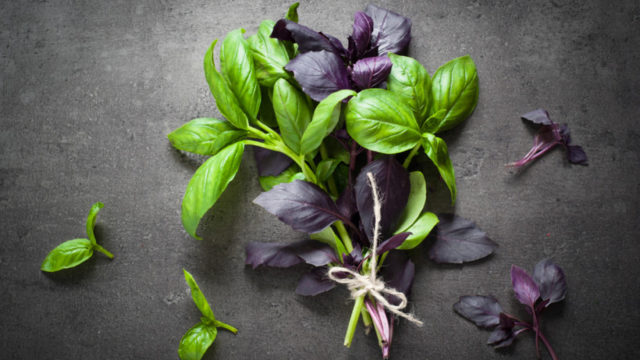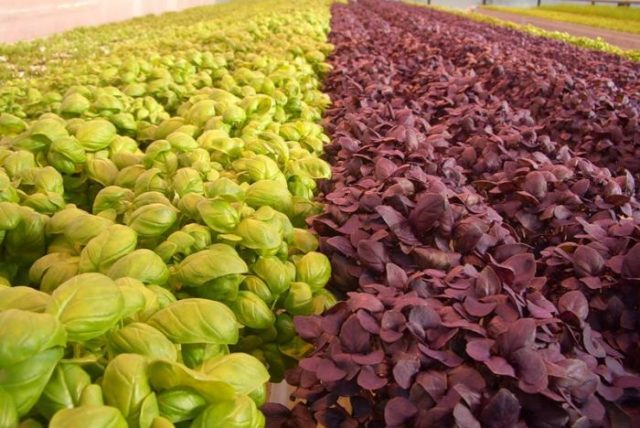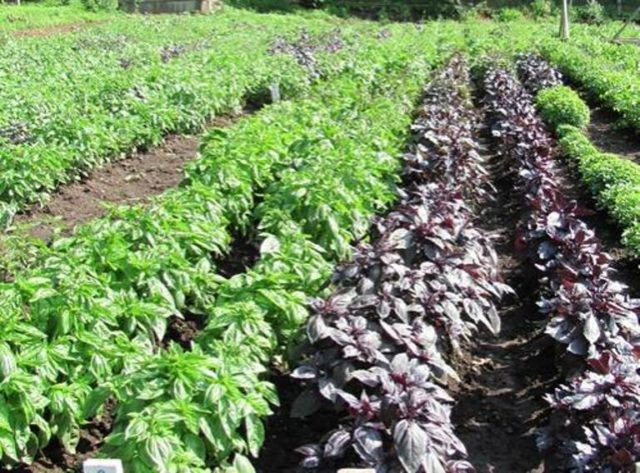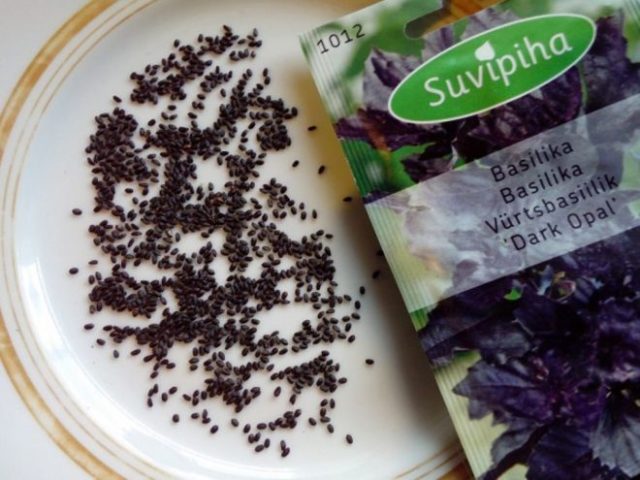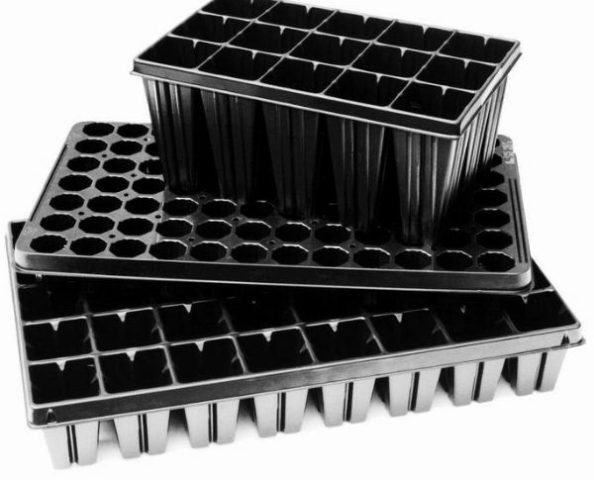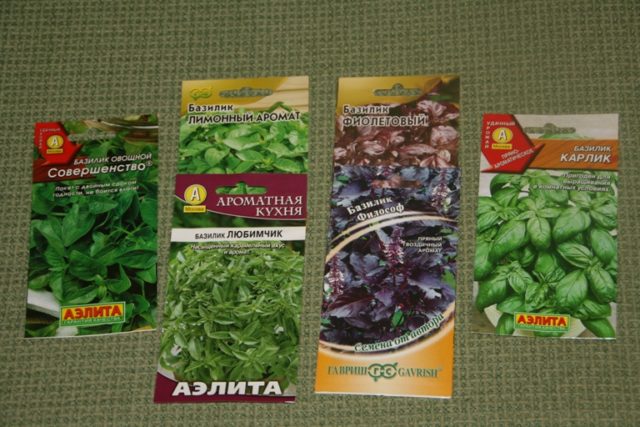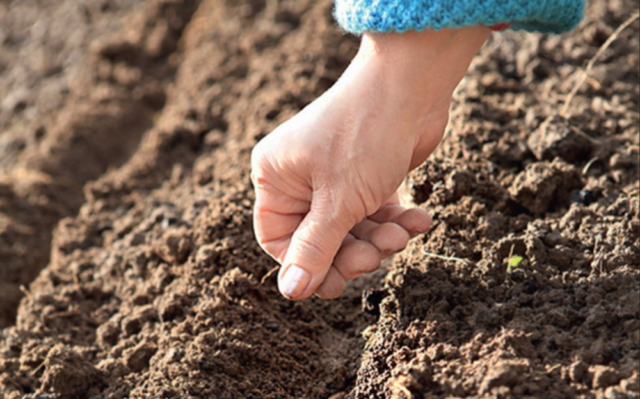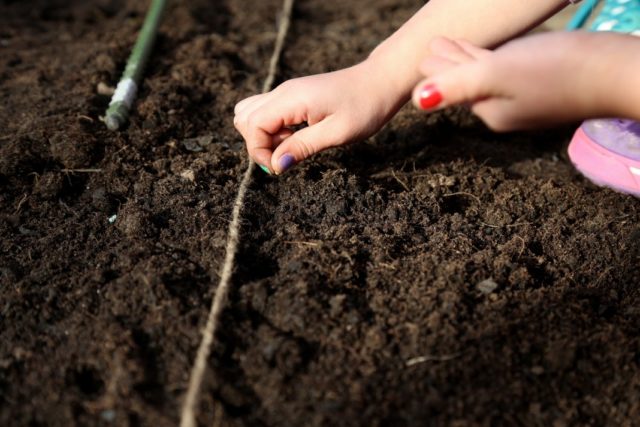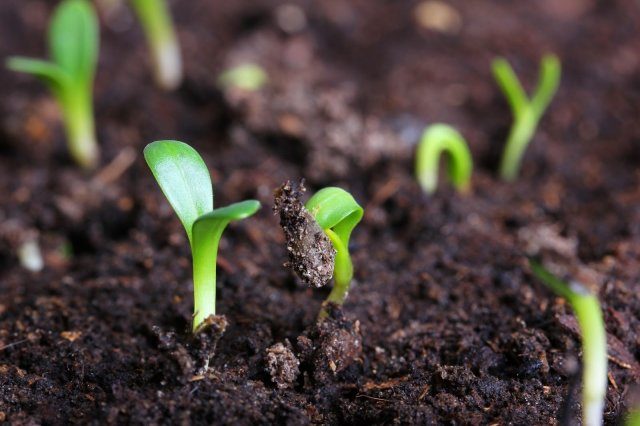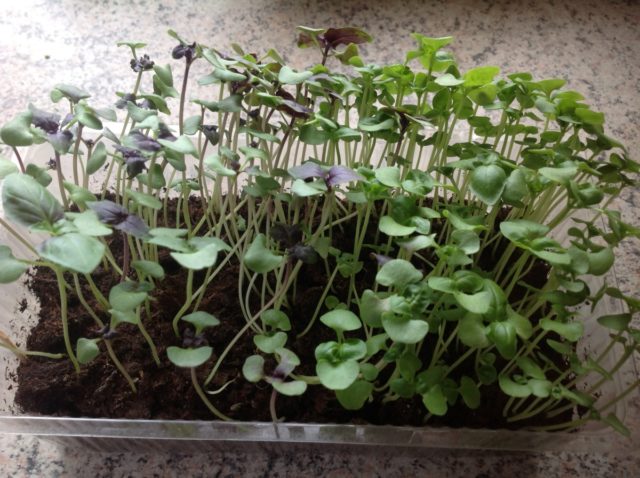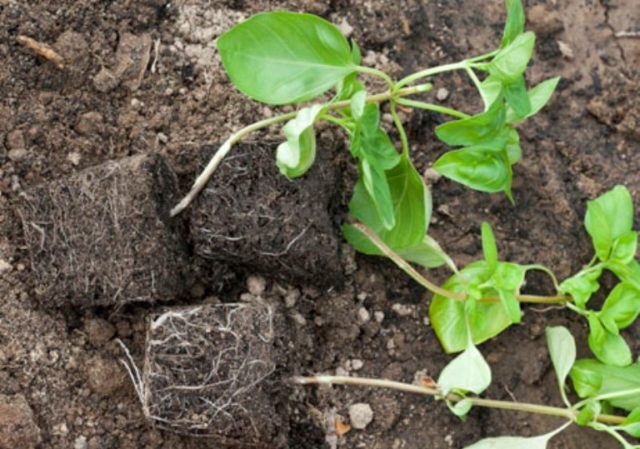Content
Growing basil from seeds on your own makes sense if you plant a crop not only for your own consumption, but also for sale. The average family needs only a few bushes to provide themselves with fresh, dried spices and medicinal raw materials. They are easier to buy in the market.
But there they usually sell several varieties, and often the sellers themselves do not know which ones, but divide them by color: red and green basil. If gardeners or designers want to grow a specific or exotic variety, you will have to tinker with the seeds. There is nothing difficult in this, especially if there is a minimum skill of picking - you cannot do without it.
When to plant basil
Sowing basil is carried out, focusing on the fact that the culture is very thermophilic. The slightest decrease in temperature will lead to a halt in development, and even a short-term frost will surely destroy the plant.
When to sow basil seedlings
In most regions of Russia, basil is grown only through seedlings. Depending on climatic conditions, planting seeds is carried out from mid-March to the end of April. This period is quite extended, but most gardeners who grow basil for their own needs only carry out one harvest. Of course, not counting the preparation of pickles and salads with fresh leaves.
When sown early, basil will quickly gain green mass and make it possible to harvest the green mass several times. In the northern ones, the seedlings will outgrow, but they will take root well, even if they are not planted in peat cups.
Sowing basil late, it will still yield several harvests in the southern regions. In the central ones it will be possible to make 1-2 cuts. In the north, the crop will probably yield one crop, but basil is needed for own consumption very little. By and large, an average family can get by for a whole season by being able to give one bush.
When to plant basil seeds outdoors
As a thermophilic culture, basil cannot be sown into the ground before the threat of frost has passed. Russia is a very large country, warm weather is uneven. In the northern regions, planting basil outdoors with seeds just doesn't make sense. What's the use of waiting until the soil warms up enough to allow sowing - so you may not get a crop. In the south and in the center, basil is sown in open ground at the same time as cucumbers.
The term is determined by weather conditions. Before planting the seeds, the ground should warm up well to a depth of 10 cm. If the soil temperature is below 10 ° C, the basil simply will not germinate. Seeds are usually planted from late May to early June. Later, the heat can destroy tender seedlings.
How to plant basil seedlings
If the gardener is familiar with the basics of diving seedlings, he will easily grow basil. This crop requires minimal maintenance, not only in the open field after planting, but also in the initial phases of development.
Preparing a container for planting
For sowing seeds, it is best to use special seedling trays, which are readily available and inexpensive. Rinse them thoroughly before use. If they were stored in unsuitable conditions or for some reason have not been cleared from the ground since last year, the cassettes are first washed clean, then soaked in potassium permanganate, rinsed and filled with soil.
Many gardeners are accustomed to using standard 8x30x60 cm planting boxes or other shallow dishes with bottom holes. We should dwell on their preparation in more detail.
Seedling boxes are washed, if necessary, disinfected with potassium permanganate, scalded with boiling water, dried. Then they are installed in a warm, well-lit place and filled with planting mixture. To do this, it is better to take ordinary purchased soil for seedlings.
The most common mistake when preparing a planting box is that gardeners are trying to cram drainage in there. Of course, if the seedlings are sown in an ordinary flower pot or other unsuitable dish, a layer of expanded clay or gravel must be made. But in planting boxes, it is not only not needed, but it can also cause low germination of seeds - under the influence of water, the soil will sag and they will simply fall through.
How to properly fill the seedling container with soil
Not everyone knows how to properly fill seedling boxes, but any mistake will lead to lunges, black leg. You can even ruin crops.
The sequence for filling the seedling container correctly:
- The landing box is immediately installed in a permanent place. It should be taken into account that water for irrigation will spill through the lower holes and lay an oilcloth or provide a pallet.
- Sift the substrate before laying. Then they fill 2/3 of the box and tamp it tightly using your hands and any heavy object. Particular attention is paid to the perimeter. Using your fingers, applying force, the soil is pressed, poured and pressed again so that there is not a single badly trampled place between the edges of the box and the substrate. The surface is leveled with an impromptu iron such as a trowel.Comment! After proper ramming, the box will be less than half full.
- Pour loose soil to the edge of the box. They walk along the perimeter, with a forceful touch. Ideally, it will be impossible to stick a match into the soil near the side.Important! Only the area at the very walls needs to be rammed and crushed so hard.
- With an open palm, lightly press down on the soil, then equalize with an iron.
Filling the planting box with substrate will take longer than you might think. This procedure is not easy even for experienced gardeners, but it must be done carefully - the quality of the seedlings directly depends on this.
It is best to prepare the box just before sowing the seeds. If something distracts, or the work has to be postponed, you should wrap the container with cellophane so that the substrate does not dry out.
Seed preparation
Basil seeds are buried dry. A variety of tips to soak them before planting to destroy the shell only adds to the worries. Swollen basil seeds are covered with a slippery shell that is difficult to handle. It is impossible to sow them evenly. In addition, soaking the seeds of this crop will not accelerate their germination. It's easy to check if you want.
Basil seeds are usually sold packaged up to 0.5 g. And this is a lot - 1 g contains 600-900 pieces, it all depends on the variety, and their size is not so small.
How to sow basil seedlings
Sowing basil seeds for seedlings in cassettes is very simple. The video will tell you the best about it:
In boxes that are more familiar to the older generation, you can also grow high-quality seedlings. The downside here is the need for a pick. Not everyone loves it and can do it correctly without destroying half of the sprouts along the way. And basil is not a tomato, damage to the root system, which cannot be avoided when picking, is not beneficial to this culture. It will take time to recover and resume growth processes.
The advantages of growing seedlings in boxes include:
- significant space savings;
- easier to water;
- boxes are more durable than cassettes;
- it is easier to move them if necessary.
Furrows 5 mm deep are made along one wall of the seedling box at a distance of 5 cm from each other, they are spilled with warm water and seeds are rarely sown. Then they are covered with soil, sprinkled abundantly from a household spray bottle, covered with glass or film.
When sowing dry basil seeds at a temperature of 20-24⁰C, the first shoots will appear in 10-14 days, if it is increased to 25-28⁰C - after 7-10 days. Keeping in a cool (below 20⁰) room does not make sense.
Every day, the planting needs to be ventilated, removing the shelter and checking the moisture content of the soil. If necessary, the soil should be scoured with a spray bottle. It should not be wet in any case.
Seedling care
Basil seedlings do not need special care. They only need to be regularly watered with warm water, preventing the soil from sticking so that a black leg does not appear. At the first signs of the disease, seedlings are treated with a weak solution of copper sulfate, dissolving 1 teaspoon of the drug in 2 liters of warm water.
To prevent basil seedlings from stretching, the lighting must be intense, at least 10 hours a day. If necessary, seedlings will have to be illuminated. The optimum temperature in the room is 25-28⁰C, at 20⁰, the basil seedlings stop their development.
When two real leaves appear, a pick is made. Of course, if necessary, basil seedlings planted in cassettes do not need it. As a tool, it is convenient to use a wooden stick about 15 cm long, planed at one end in the form of a flattened peg. It can easily get sprouts out of the ground, make depressions and press the shoot to the ground in a new place. It is extremely inconvenient to do this with your fingers.
Basil seedlings can be dived into separate containers, cassettes or into the same planting boxes. They change the substrate, stuff in the usual way (not as carefully as for seedlings). Plants are arranged in rows, no closer than 5 cm from each other, and if it is already clear that planting will be carried out later than 25 days after the appearance of the seedlings, then further.
A week after the picking, the basil seedlings are fertilized (if it has taken root, that is, it has started to grow again). To do this, dissolve in a liter of water:
- ammonium nitrate - 2 g;
- superphosphate - 4 g;
- wood ash - 2 tsp.
The second feeding is given 10-14 days after the first. To stimulate your own immunity, it is useful to spray the seedlings alternately with epin and zircon once a week.
You need to pinch the seedlings when 4-6 real leaves appear. It is best to cut off the tops with nail scissors, rather than tear off - this way you can accidentally pull the whole basil out of the ground.
How to plant basil seeds outdoors
In the northern regions, sowing basil in the ground does not make sense at all. If you wait for the soil to warm up in Central Russia, you can bring a crop grown in a seedless way to the stage where you can cut off shoots for drying only in warm summer. Otherwise, it will not pick up enough essential oils, and will be suitable only for freezing or fresh consumption. In the south, the soil warms up quickly, the seeds germinate well, just the first cut of the basil grown through seedlings is carried out much earlier than when sowing directly to the garden.
Landing site preparation
Before sowing seeds, the ground must be dug up at least half the bayonet of a shovel. If the basil will later be planted (which is preferable), sand is added beforehand. Heavy soils are not suitable for planting seeds. They need to be improved by adding additional lowland or transitional peat.
The site is freed from stones, weed roots, dug up, leveled, and allowed to settle for at least 2 weeks. Basil seeds, of course, are not the smallest, but if this is not done, they will easily fall through and "get lost." Because of this, the shoots will appear later, and there will be few of them - some shoots will not be able to break through. In addition, the upper layers of the soil are warmed up much better.
You cannot sow basil where spicy-aromatic herbs have already grown. They release substances into the soil that not only repel pests, but also inhibit their own growth.
Seed preparation
Basil seeds do not need to be cooked before planting in the soil. Soaking does not accelerate germination. In addition, it is almost impossible to evenly distribute slimy swollen balls in the soil.
Basil seed sowing rules
Basil seeds begin to germinate at a temperature of 15-16 ° C. But it must be borne in mind that in the soil in the spring it is much lower than the street thermometer shows. Basil is sown when the ground has warmed up well, and its temperature has become almost the same as the air. This happens quite late - around the end of May, and for some regions - not earlier than June.
On the garden bed with a glanders, a flat cutter, or another tool, shallow (about 1 cm) rows are drawn every 15 cm, they are watered with warm water and basil is rarely sown. It is not difficult to distribute the seeds correctly - they are quite large. Consumption rate - 0.5-0.6 g per 1 sq. m.
Then the bed is carefully leveled with a rake. Do not water. Basil seeds will receive enough moisture - after all, the rows have been pre-saturated with water.
Care after landing
Immediately after planting, the bed is covered with a film - this will retain moisture and accelerate the germination of the basil. After the first sprout has appeared, they begin to lift the cellophane during the day to ventilate and moisturize the seedlings. Watering should be done with warm water.
It is very useful to spray seedlings once a week, alternating preparations with zircon and epin - this will make them more resistant to adverse factors, for example, overflows or temperature extremes. By the way, the worst thing that can be done with basil in the initial stages of development is not to forget to cover it for the night, but to overmoisten the soil.
When two real leaves appear and fully take shape, the crops can be fed with urea, diluting it 2 times more than recommended by the instructions, or with special fertilizers for seedlings.
At this time, watering, weeding is carried out, the soil is loosened 1-2 times a week. 10-14 days after the first feeding, the second is given, using a complex fertilizer diluted in half.
It will be possible to plant basil about 25 days after pecking the seedlings.
How to plant basil in open ground with seedlings
When not only the air, but also the soil in the area warms up, you can plant basil seedlings. Overgrown bushes will take root more slowly than short unbranched tails, and over time they will almost equal them in development.
Seedling preparation
7 days before planting, the temperature of the seedlings is lowered to 15-17⁰ C during the day, and the temperature at night - to 12-15⁰, and watering is reduced. If the weather is warm, calm, basil is taken out for several hours in the yard. This is called seedling hardening. It is necessary so that after moving into the ground, the plant does not receive a shock, but quickly takes root and grows, spending less time on adaptation.
On the eve of planting, the seedlings are watered, but not abundantly, but so as to only moisten the earthen lump.
Soil preparation
The land for planting basil is prepared in the same way as for sowing seeds - they loosen, remove the roots weeds and align. For digging on good black soil, you can not add anything. If you need to get a large yield of green mass, 0.5 buckets of humus, a glass of ash are introduced for each square meter, and sand, transitional or low-lying (black) peat are introduced into dense soil.
After digging, the soil is allowed to settle for at least 2 weeks. But what to do when this time, for some reason, is not there? Then, after loosening, the bed is watered, and if a hose is used, they try to spray the stream as much as possible, and the next day they start planting.
How to plant basil seedlings
A shallow hole should be dug under each bush, filled with water. Then remove the basil from the pot or cassette, place it in the center, cover the root and 1-2 cm of the stem with soil. Squeeze the soil with your hands and water.
If the seedlings were grown in a peat cup, you do not need to remove it. When picking is carried out not in separate containers, but in planting boxes, basil grows in rows close to each other. The question arises of how to remove it, minimally damaging the roots. Experience has shown that it is better to take out such seedlings with a spoon - a tea or table spoon, depending on the size of the seedling.
Basil can form roots on stems, thanks to which it is propagated vegetatively if necessary. So, if you do not overfill, he is not afraid of deepening.
The scheme of planting basil in the garden - between plants 30 cm, in rows 40 cm. Varieties that form large bushes should be placed more freely. The same applies to plants that are not planned to be cut to obtain fragrant greens - basil, intended for drying, is overgrown with a large number of side branches and takes up a lot of space.
Further care
The first time after transplanting into the ground, basil seedlings are often watered, only with warm water. But it is better not to allow waterlogging - the culture does not like this and is prone to rotting of the stem. It is better to alternate watering with loosening - this way the moisture remains in the soil, the roots breathe, and the weeds grow less.
Diseases and pests
Basil is not only rarely affected by pests, but it also protects other crops from their invasion - insects do not like the essential oils contained in the plant. Diseases also bypass bushes, planted freely and watered in moderation.
Conclusion
Growing basil from seeds is a task for beginners. Gardeners typically need far fewer plants than the contents of a single sachet can provide. So on culture you can train in a dive.
